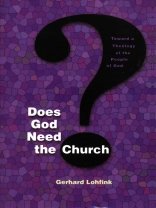Are not all religions equally close to and equally far from God? Why, then, the Church? Gerhard Lohfink poses these questions with scholarly reliability and on the basis of his own experience of community in Does God Need the Church?
In 1982 Father Lohfink wrote Wie hat Jesus Gemeinde gewollt? (translated into English as Jesus and Community) to show, on the basis of the New Testament, that faith is founded in a community that distinguishes itself in clear contours from the rest of society. In that book he also described a sequence of events that moved directly from commonality to a community that was readily accessible to every group of people and was made legitimate by Jesus himself. Only later did Father Lohfink learn, within a new horizon of experience, that such a description is not the way to community. The story of the gathering of the people of God, from Abraham until today, never took place according to such a model.
Today Father Lohfink states that he would not write Wie hat Jesus Gemeinde gewollt? the same way. The situation of belief and believers has undergone a shift: the question of the Church has become much more urgent. Church life is declining and the religions are returning, often in new guises.
In light of these shifts and the change in his own view of community, Father Lohfink inquires in Does God Need the Church? of Israel’s theology, Jesus’ praxis, the experiences of the early Christian communities, and of what is appearing in the Church today. These inquiries lead to an amazing history involving God and the world – a history that God presses forward with the aid of a single people and that always turns out differently from what they think and plan.
A propos de l’auteur
Gerhard Lohfink (1934-2024), was professor of New Testament exegesis at the University of Tübingen. His many books include No Irrelevant Jesus, Jesus of Nazareth, Is This All There Is?, The Our Father, and Prayer Takes Us Home, all from Liturgical Press.







![Couverture du Brian Schrag & Julisa Rowe: Community Arts for God's Purposes [Chinese] 貼近神心意的社群藝術 Couverture du Brian Schrag & Julisa Rowe: Community Arts for God's Purposes [Chinese] 貼近神心意的社群藝術](https://static.worldofdigitals.com/thumb_webp/740/9781645083740.webp)




